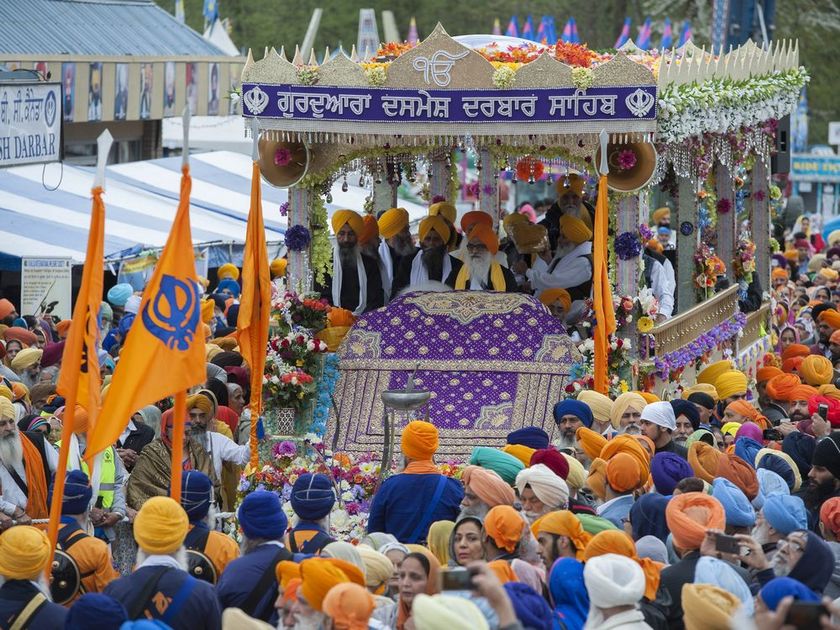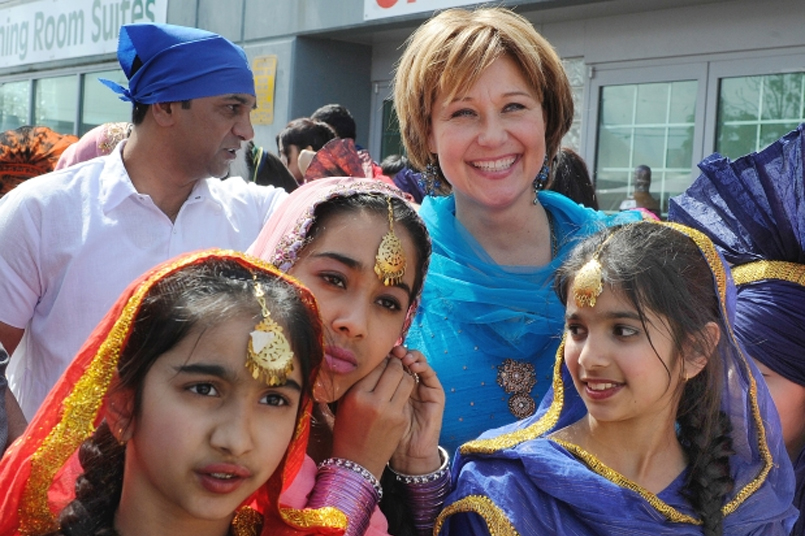
It’s time to celebrate Vaisakhi
Op-ed originally published in The Vancouver Sun on April 12, 2018. Photograph by: Jason Payne
Dust is slowly settling on Prime Minister Justin Trudeau’s turbulent trip to India and the diplomatic fallout from convicted terrorist Jaspal Atwal’s presence in India with the Trudeaus. Federal NDP leader Jagmeet Singh has finally condemned use of political violence and “all acts of terrorism in every part of the world”.
But Canadians are left with the impression of widespread Sikh support in Canada for an independent Sikh homeland carved out of India. A very small Sikh group known as “Khalistanis” use Canadian politicians and institutions to further this goal. Meanwhile, India accuses our politicians of giving tacit approval to this cadre with its tentacles into Canada’s political parties, particularly the federal Liberal party. Jagmeet Singh’s stated objective to pass a motion in parliament declaring the 1984 anti-Sikh violence in India a “genocide” is casting a dark cloud over Canada-India relations and risks fracturing the Indo-Canadian community.
With the upcoming Vaisakhi parades in Vancouver, Surrey and Toronto, Canadians might be wondering about the real intent behind the parades. Which politicians will be courting temple leaders and factions within the vote-rich Punjabi Sikh community? Undoubtedly, many politicians may be reluctant to attend the parades for fear of being photographed with questionable individuals who display admiration for the Air India bomber Talwinder Singh Parmar and others who inspired the violent struggle for Khalistan.
Let’s clear the air for an open dialogue: Sikhs are not terrorists. The majority of them do not want a separate homeland.
Five centuries ago, Guru Nanak, founder of Sikhism, spoke against tyranny and oppression. Courageously, he described the politics of his time “as like drawn knives, kings like butchers. Righteousness has fled on wings. The dark night of falsehood prevails, and the moon of truth is nowhere visible.” All of the 10 Sikh gurus were subversive and social entrepreneurs. They championed the ideas of one God, diversity and inclusion. They called upon all to live truthful lives marked by honest work and sharing with others in need.
“Langar” (a communal kitchen and common meal) was introduced by Guru Nanak to break down caste, creed, colour and social status barriers, and to unite people as equals. Hungry people today eat in Sikh temples from Amritsar to Abbotsford, Birmingham to Brampton, and New Delhi to New York. Sikh belief in the oneness of God and the oneness of humanity threatens power structures, whether built upon the caste system in India or on ethnic, language, race and religious superiority elsewhere.
It is important for Canadians to understand the meaning of Vaisakhi. It is a centuries-old harvest festival celebrated yearly in April bringing diverse people together. Vaisakhi became significant for the Sikhs in 1699 when the tenth guru, Gobind Singh (1666-1708), baptized five men and was himself baptized by them creating the “Khalsa” (community of the pure). The five outward symbols of the Khalsa identity represent inner strength and commitment to truthful living.
Vancouver and Surrey Vaisakhi processions are amongst the largest and most colourful in the world. All Canadians are welcome to join and enjoy Langar (free food) along the parade routes. Like Thanksgiving Day, Vaisakhi includes charity, praying for prosperity for all, and gratitude for the harvest. Sikhs wish to celebrate Vaisakhi by focusing more on the core values of inclusion, equality, community service, and harmony, and less on the political agendas of the politicians and narrow-minded groups within the Sikh community.
We may never know to what degree Trudeau’s trip has affected Canada-India relations. But we do know Sikhs are an integral part of India as they are of Canada. Canadian politicians should continue to participate in Vaisakhi celebrations, affirm the territorial unity of India, and denounce promotion of all political violence by anyone. They should also avoid the cultural appropriation of the Sikh turban, as it is not a fashion accessory or part of a costume. It is a sacred expression of faith and identity.
Happy Vaisakhi, Canada!
Celebrating Vaisakhi in Vancouver
April 12th, 2014 was a beautiful day to celebrate Vaisakhi in Vancouver.
My wife Rita and I had the pleasure of spending time with family, as well as meeting new and old friends.
Enjoy these photographs from the Vaisakhi parade:

Politicians should try and understand Vaisakhi festival
Opinion: Keep Vaisakhi festival’s true meaning in mind during election
By Barj S. Dhahan, Special to The Vancouver Sun, originally published April 11, 2013
This week, preparations are underway for the popular Sikh festival of Vaisakhi. Sikhs from Amritsar to Abbotsford, Birmingham to Brampton, New York to Nankana Sahib are getting ready to celebrate this historic and deeply spiritual event.
While families are happily anticipating joining in the festivities including kirtan (singing of religious hymns), savouring samosas and Indian sweets, and performing bhangra, B.C. politicians are feverishly jockeying to find the best appearance spots at the Vaisakhi parades (in Vancouver April 13, and in Surrey April 20). They are also vying for the most opportune time to speak in the Sikh gurdwaras (temples). With at least 12 ridings in the province in which the Punjabi Sikh voters will decide the May 14 election outcomes, it is no wonder that politicians will try to curry favour with the Vaisakhi celebrants.
Political appearances at the parades are sure to be met with greater skepticism now than in the past due to the recent “ethnic strategy” controversy. And perhaps they should be. Perhaps we should take a moment to reflect on the true meaning of Vaisakhi so all British Columbians might participate in the festivities in a mindful and meaningful way.
Vaisakhi is a harvest festival and a time for thanksgiving. It has been celebrated in Northern India, Pakistan and other parts of the Indian sub-continent for thousands of years as a time to welcome the season of spring — a time for new life, growth and renewal. On April 13, 1699, Guru Gobind Singh, the 10th and the last Sikh guru, called on his followers to congregate at Anandpur (City of Bliss), Punjab for a special baptism ceremony to mark Vaisakhi. Following a dramatic ceremony, he called on his followers to adhere to certain rules, principles and values, and to courageously devote their lives to justice and equality.
On that day the Khalsa – “community of the pure” – was founded. Baptized Sikhs were to have an external appearance (the keeping of the five Ks — uncut hair, comb, bangle, sword and breeches) symbolizing inner contentment, purity of intention and commitment to pursuit of truth. Behaviours, such as not disturbing the natural growth of hair and not consuming alcohol or other intoxicants and living with restraint, were encouraged.
More relevant to this discussion, all Sikhs, whether baptized or not, are to respect themselves and others, to recognize all people as equals, to earn an honest living, to give to charity, not to cheat or lie, to seek social harmony and to be engaged in the affairs of the world — economic as well as political.
B.C. voters, then, should not be surprised by the nearly 25 candidates of Punjabi-Sikh heritage running in this election. There are at least 12 candidates for the NDP, six for the Liberals, three for the B.C. Conservatives, one for the Greens and one independent.
Vaisakhi is not just a parade or a time to be seen. It is a day to celebrate the values above and to examine our intentions going forward. It is a time for renewal of self and a commitment to work for the greater good.
The Guru called on his followers to self-reflect, to respect their communities, to struggle for equity and equality and to build peace. It is important to reflect on these values and how they may impact our voting choices. These values may help us discern what the important issues are in this election and which party and candidates are best able to address them with a clear vision for the province.
Which party will genuinely work toward environmental sustainability while ensuring economic opportunity for all? How might our vote contribute to creating a safe and respectful community, how will it promote tolerance and inclusion, and how will it help eradicate discrimination based on economic, gender, religious, ethnic or any other difference?
In light of the upcoming campaign with the expected negative attack ads, we would be wise to study and reflect on who might best carry out these values as our representatives and legislators. I hope each participant in this year’s parades will take some time to do just that.
Barj S. Dhahan is national chair of the Canada India Foundation and director of the Canada India Education Society.
This op-ed article was originally published in The Vancouver Sun on April 11, 2013.







